Detailed Analysis of Termite Resources NL Case in Corporations Law
VerifiedAdded on 2022/10/02
|5
|1366
|63
Case Study
AI Summary
This case study analyzes Termite Resources NL (in liq) v Meadows, focusing on alleged breaches of directors' duties under the Corporations Act 2001 (Cth). The liquidators of Termite Resources NL brought an action against six former directors and officers, claiming breaches of sections 180 and 181. The case revolves around the adoption and implementation of a Distributions Policy, which involved the distribution of funds to Outback's shareholders, Taifeng and IMX. The court considered whether the directors of Outback could be considered as directors of Termite, and if they breached their statutory duties by prioritizing the interests of Taifeng and IMX over Termite's, potentially leading to insolvency risks. The judgment addressed the issue of whether the directors acted with care and diligence, the adequacy of financial reserves, and the consequences of breaching directors' duties, including the piercing of the corporate veil. The court found that the directors of Outback were deemed directors of Termite and that they breached their duties, resulting in a financial award to Termite. The analysis highlights the importance of directors' responsibilities, the implications of prioritizing shareholder interests, and the application of relevant legal principles.
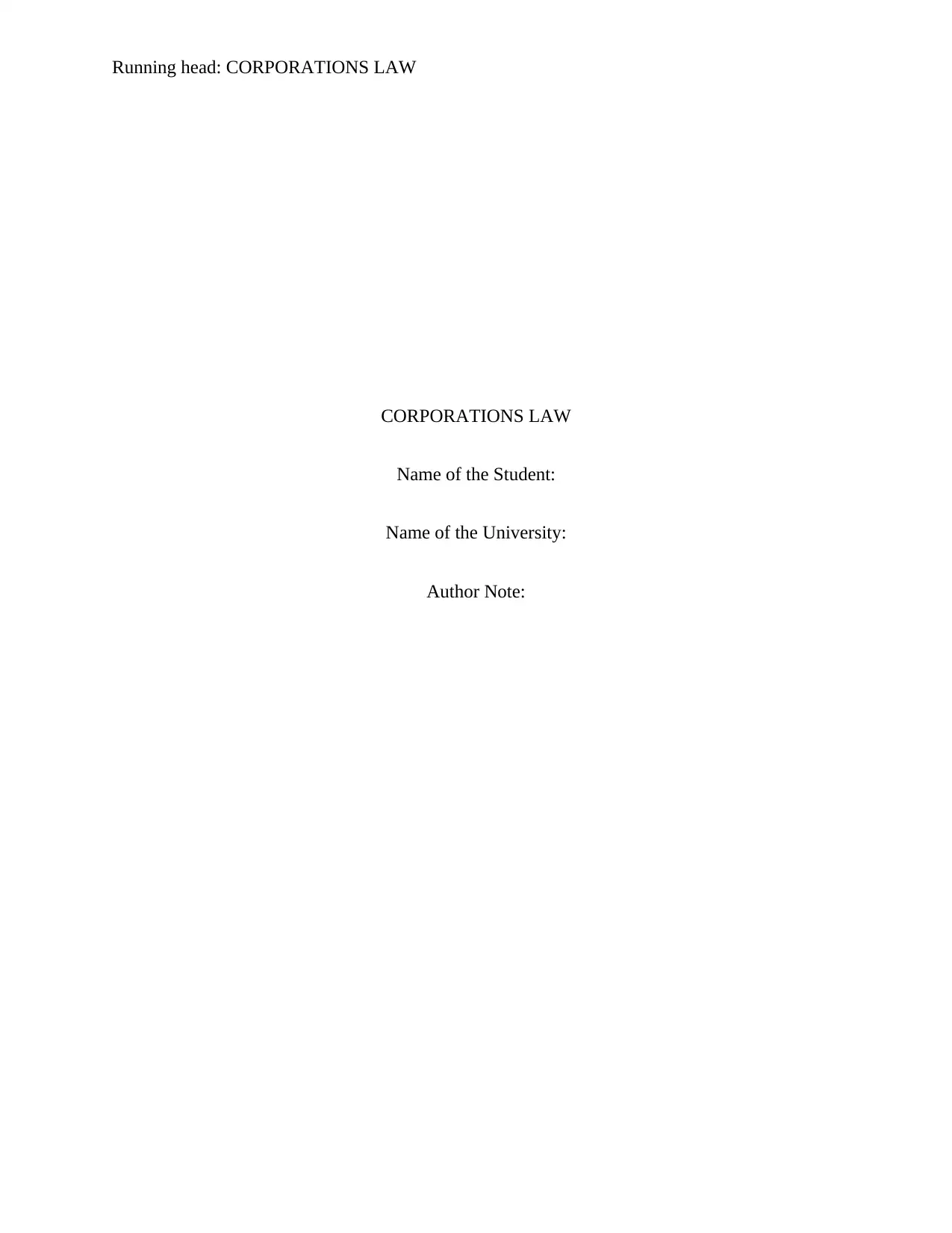
Running head: CORPORATIONS LAW
CORPORATIONS LAW
Name of the Student:
Name of the University:
Author Note:
CORPORATIONS LAW
Name of the Student:
Name of the University:
Author Note:
Paraphrase This Document
Need a fresh take? Get an instant paraphrase of this document with our AI Paraphraser
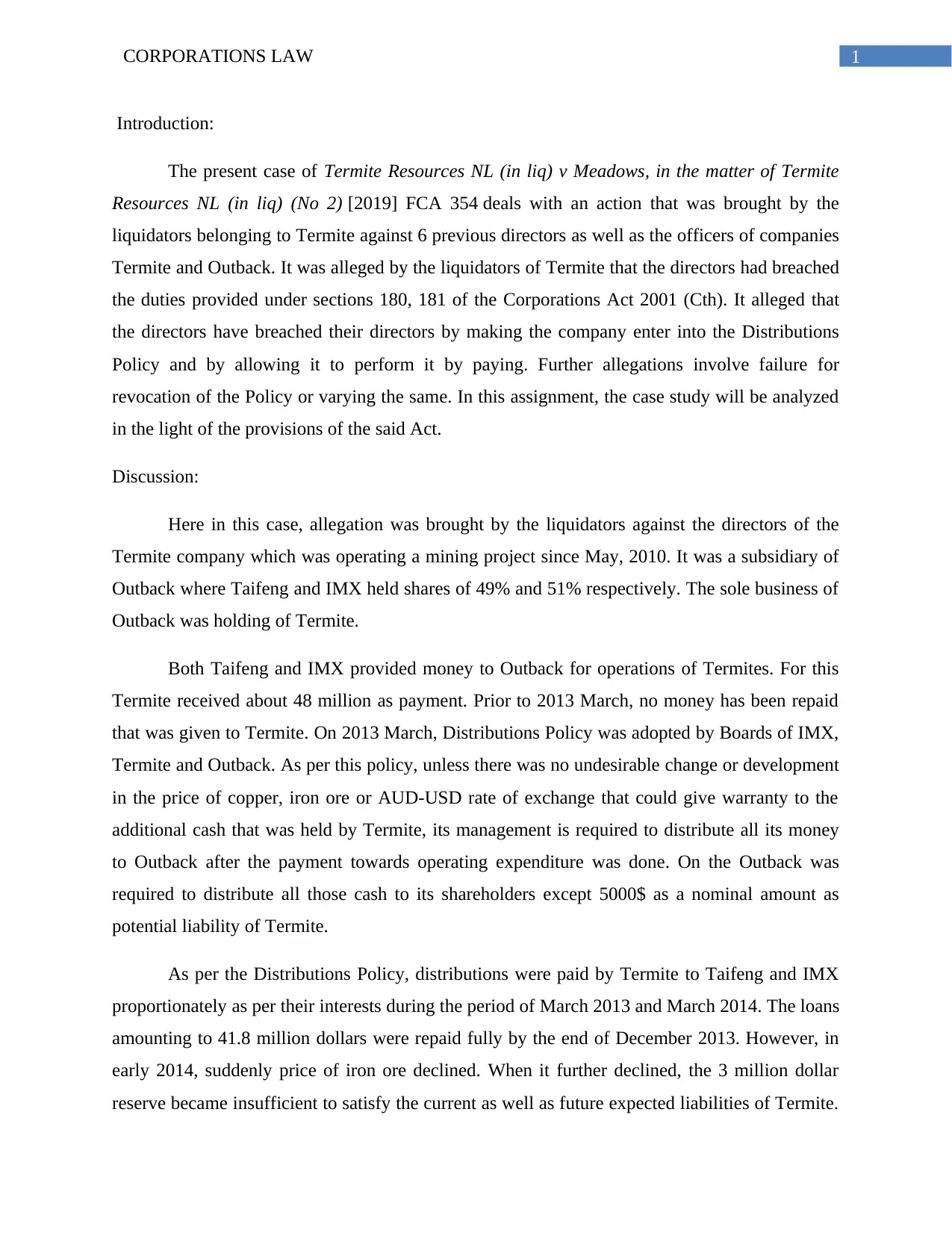
1CORPORATIONS LAW
Introduction:
The present case of Termite Resources NL (in liq) v Meadows, in the matter of Termite
Resources NL (in liq) (No 2) [2019] FCA 354 deals with an action that was brought by the
liquidators belonging to Termite against 6 previous directors as well as the officers of companies
Termite and Outback. It was alleged by the liquidators of Termite that the directors had breached
the duties provided under sections 180, 181 of the Corporations Act 2001 (Cth). It alleged that
the directors have breached their directors by making the company enter into the Distributions
Policy and by allowing it to perform it by paying. Further allegations involve failure for
revocation of the Policy or varying the same. In this assignment, the case study will be analyzed
in the light of the provisions of the said Act.
Discussion:
Here in this case, allegation was brought by the liquidators against the directors of the
Termite company which was operating a mining project since May, 2010. It was a subsidiary of
Outback where Taifeng and IMX held shares of 49% and 51% respectively. The sole business of
Outback was holding of Termite.
Both Taifeng and IMX provided money to Outback for operations of Termites. For this
Termite received about 48 million as payment. Prior to 2013 March, no money has been repaid
that was given to Termite. On 2013 March, Distributions Policy was adopted by Boards of IMX,
Termite and Outback. As per this policy, unless there was no undesirable change or development
in the price of copper, iron ore or AUD-USD rate of exchange that could give warranty to the
additional cash that was held by Termite, its management is required to distribute all its money
to Outback after the payment towards operating expenditure was done. On the Outback was
required to distribute all those cash to its shareholders except 5000$ as a nominal amount as
potential liability of Termite.
As per the Distributions Policy, distributions were paid by Termite to Taifeng and IMX
proportionately as per their interests during the period of March 2013 and March 2014. The loans
amounting to 41.8 million dollars were repaid fully by the end of December 2013. However, in
early 2014, suddenly price of iron ore declined. When it further declined, the 3 million dollar
reserve became insufficient to satisfy the current as well as future expected liabilities of Termite.
Introduction:
The present case of Termite Resources NL (in liq) v Meadows, in the matter of Termite
Resources NL (in liq) (No 2) [2019] FCA 354 deals with an action that was brought by the
liquidators belonging to Termite against 6 previous directors as well as the officers of companies
Termite and Outback. It was alleged by the liquidators of Termite that the directors had breached
the duties provided under sections 180, 181 of the Corporations Act 2001 (Cth). It alleged that
the directors have breached their directors by making the company enter into the Distributions
Policy and by allowing it to perform it by paying. Further allegations involve failure for
revocation of the Policy or varying the same. In this assignment, the case study will be analyzed
in the light of the provisions of the said Act.
Discussion:
Here in this case, allegation was brought by the liquidators against the directors of the
Termite company which was operating a mining project since May, 2010. It was a subsidiary of
Outback where Taifeng and IMX held shares of 49% and 51% respectively. The sole business of
Outback was holding of Termite.
Both Taifeng and IMX provided money to Outback for operations of Termites. For this
Termite received about 48 million as payment. Prior to 2013 March, no money has been repaid
that was given to Termite. On 2013 March, Distributions Policy was adopted by Boards of IMX,
Termite and Outback. As per this policy, unless there was no undesirable change or development
in the price of copper, iron ore or AUD-USD rate of exchange that could give warranty to the
additional cash that was held by Termite, its management is required to distribute all its money
to Outback after the payment towards operating expenditure was done. On the Outback was
required to distribute all those cash to its shareholders except 5000$ as a nominal amount as
potential liability of Termite.
As per the Distributions Policy, distributions were paid by Termite to Taifeng and IMX
proportionately as per their interests during the period of March 2013 and March 2014. The loans
amounting to 41.8 million dollars were repaid fully by the end of December 2013. However, in
early 2014, suddenly price of iron ore declined. When it further declined, the 3 million dollar
reserve became insufficient to satisfy the current as well as future expected liabilities of Termite.
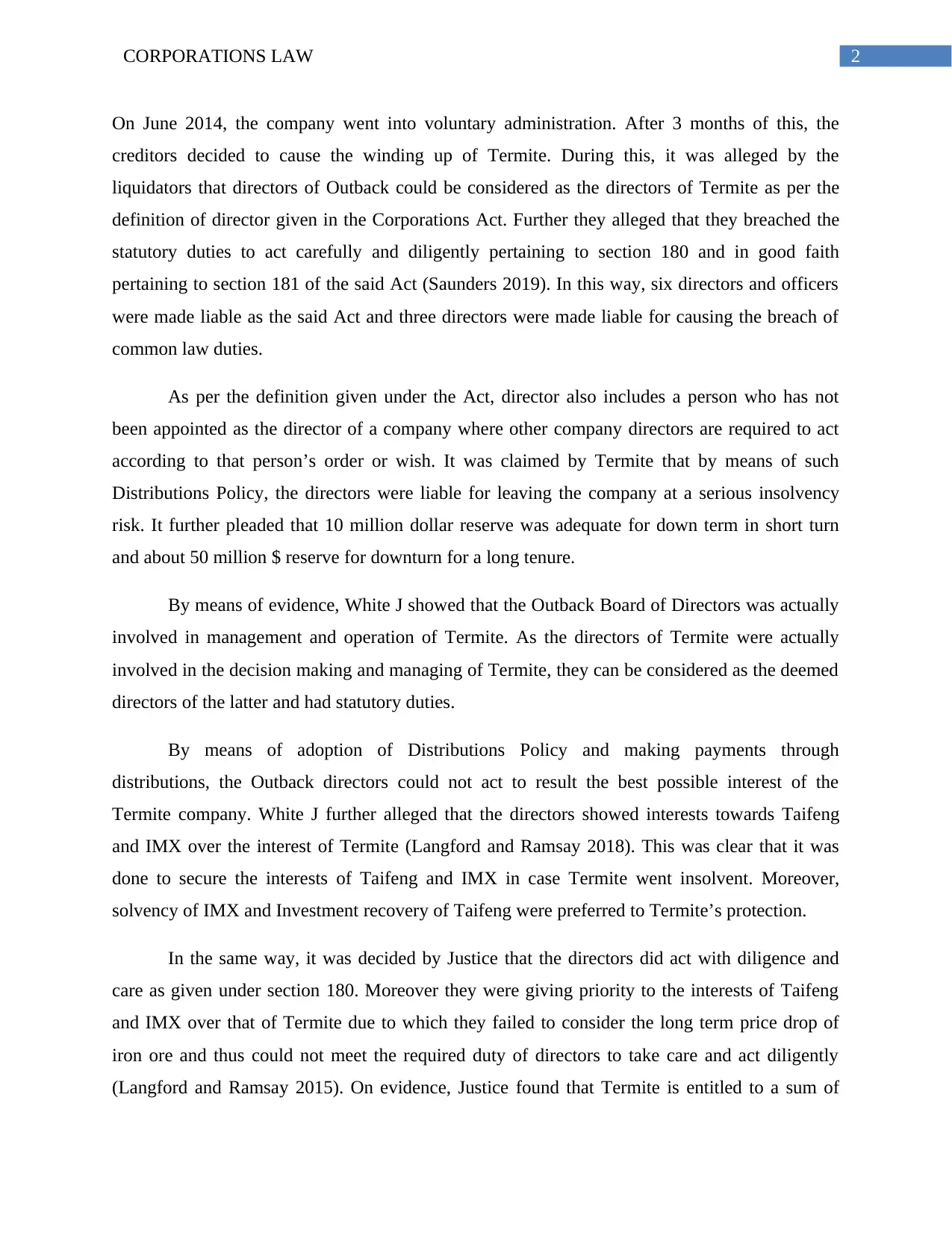
2CORPORATIONS LAW
On June 2014, the company went into voluntary administration. After 3 months of this, the
creditors decided to cause the winding up of Termite. During this, it was alleged by the
liquidators that directors of Outback could be considered as the directors of Termite as per the
definition of director given in the Corporations Act. Further they alleged that they breached the
statutory duties to act carefully and diligently pertaining to section 180 and in good faith
pertaining to section 181 of the said Act (Saunders 2019). In this way, six directors and officers
were made liable as the said Act and three directors were made liable for causing the breach of
common law duties.
As per the definition given under the Act, director also includes a person who has not
been appointed as the director of a company where other company directors are required to act
according to that person’s order or wish. It was claimed by Termite that by means of such
Distributions Policy, the directors were liable for leaving the company at a serious insolvency
risk. It further pleaded that 10 million dollar reserve was adequate for down term in short turn
and about 50 million $ reserve for downturn for a long tenure.
By means of evidence, White J showed that the Outback Board of Directors was actually
involved in management and operation of Termite. As the directors of Termite were actually
involved in the decision making and managing of Termite, they can be considered as the deemed
directors of the latter and had statutory duties.
By means of adoption of Distributions Policy and making payments through
distributions, the Outback directors could not act to result the best possible interest of the
Termite company. White J further alleged that the directors showed interests towards Taifeng
and IMX over the interest of Termite (Langford and Ramsay 2018). This was clear that it was
done to secure the interests of Taifeng and IMX in case Termite went insolvent. Moreover,
solvency of IMX and Investment recovery of Taifeng were preferred to Termite’s protection.
In the same way, it was decided by Justice that the directors did act with diligence and
care as given under section 180. Moreover they were giving priority to the interests of Taifeng
and IMX over that of Termite due to which they failed to consider the long term price drop of
iron ore and thus could not meet the required duty of directors to take care and act diligently
(Langford and Ramsay 2015). On evidence, Justice found that Termite is entitled to a sum of
On June 2014, the company went into voluntary administration. After 3 months of this, the
creditors decided to cause the winding up of Termite. During this, it was alleged by the
liquidators that directors of Outback could be considered as the directors of Termite as per the
definition of director given in the Corporations Act. Further they alleged that they breached the
statutory duties to act carefully and diligently pertaining to section 180 and in good faith
pertaining to section 181 of the said Act (Saunders 2019). In this way, six directors and officers
were made liable as the said Act and three directors were made liable for causing the breach of
common law duties.
As per the definition given under the Act, director also includes a person who has not
been appointed as the director of a company where other company directors are required to act
according to that person’s order or wish. It was claimed by Termite that by means of such
Distributions Policy, the directors were liable for leaving the company at a serious insolvency
risk. It further pleaded that 10 million dollar reserve was adequate for down term in short turn
and about 50 million $ reserve for downturn for a long tenure.
By means of evidence, White J showed that the Outback Board of Directors was actually
involved in management and operation of Termite. As the directors of Termite were actually
involved in the decision making and managing of Termite, they can be considered as the deemed
directors of the latter and had statutory duties.
By means of adoption of Distributions Policy and making payments through
distributions, the Outback directors could not act to result the best possible interest of the
Termite company. White J further alleged that the directors showed interests towards Taifeng
and IMX over the interest of Termite (Langford and Ramsay 2018). This was clear that it was
done to secure the interests of Taifeng and IMX in case Termite went insolvent. Moreover,
solvency of IMX and Investment recovery of Taifeng were preferred to Termite’s protection.
In the same way, it was decided by Justice that the directors did act with diligence and
care as given under section 180. Moreover they were giving priority to the interests of Taifeng
and IMX over that of Termite due to which they failed to consider the long term price drop of
iron ore and thus could not meet the required duty of directors to take care and act diligently
(Langford and Ramsay 2015). On evidence, Justice found that Termite is entitled to a sum of
⊘ This is a preview!⊘
Do you want full access?
Subscribe today to unlock all pages.

Trusted by 1+ million students worldwide
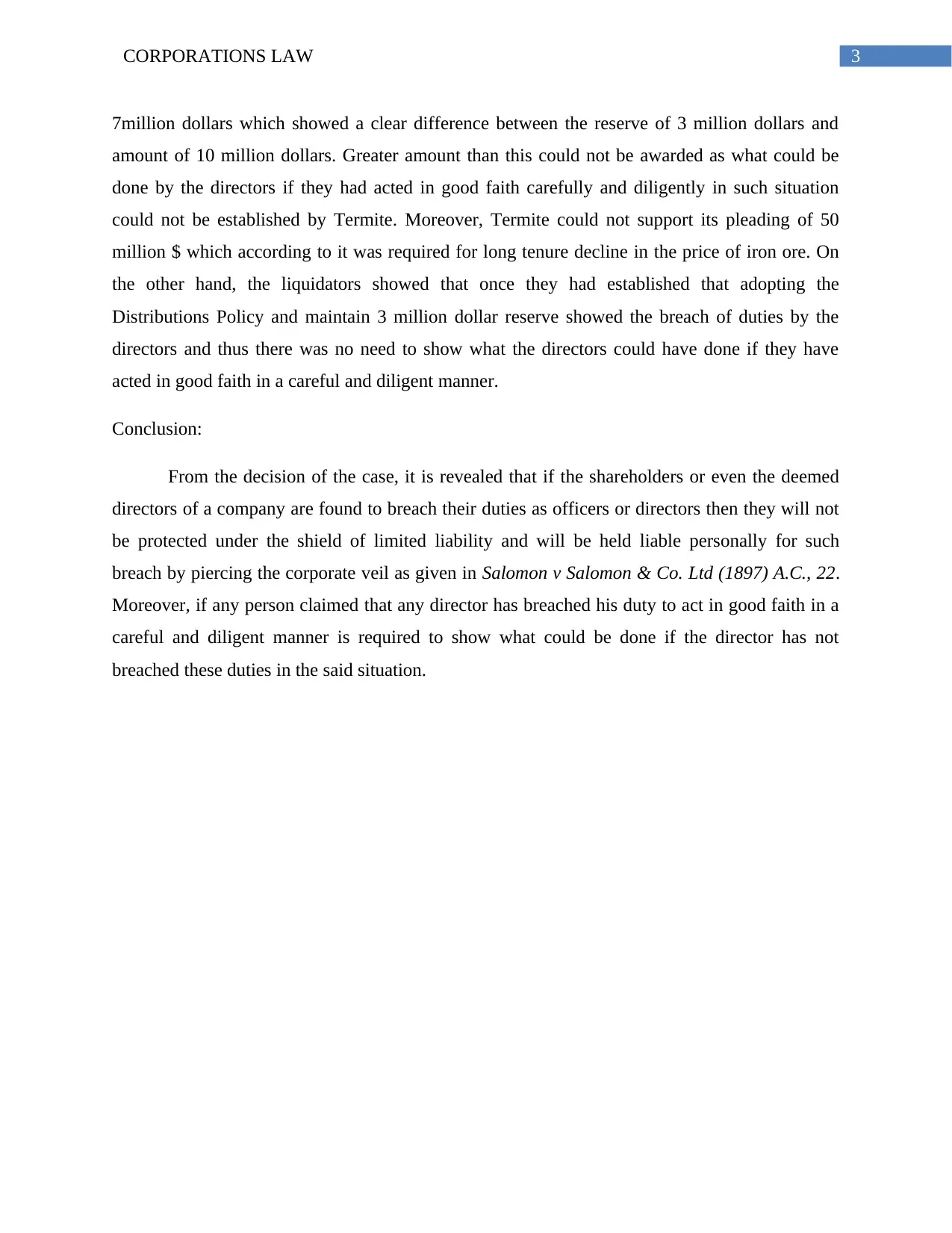
3CORPORATIONS LAW
7million dollars which showed a clear difference between the reserve of 3 million dollars and
amount of 10 million dollars. Greater amount than this could not be awarded as what could be
done by the directors if they had acted in good faith carefully and diligently in such situation
could not be established by Termite. Moreover, Termite could not support its pleading of 50
million $ which according to it was required for long tenure decline in the price of iron ore. On
the other hand, the liquidators showed that once they had established that adopting the
Distributions Policy and maintain 3 million dollar reserve showed the breach of duties by the
directors and thus there was no need to show what the directors could have done if they have
acted in good faith in a careful and diligent manner.
Conclusion:
From the decision of the case, it is revealed that if the shareholders or even the deemed
directors of a company are found to breach their duties as officers or directors then they will not
be protected under the shield of limited liability and will be held liable personally for such
breach by piercing the corporate veil as given in Salomon v Salomon & Co. Ltd (1897) A.C., 22.
Moreover, if any person claimed that any director has breached his duty to act in good faith in a
careful and diligent manner is required to show what could be done if the director has not
breached these duties in the said situation.
7million dollars which showed a clear difference between the reserve of 3 million dollars and
amount of 10 million dollars. Greater amount than this could not be awarded as what could be
done by the directors if they had acted in good faith carefully and diligently in such situation
could not be established by Termite. Moreover, Termite could not support its pleading of 50
million $ which according to it was required for long tenure decline in the price of iron ore. On
the other hand, the liquidators showed that once they had established that adopting the
Distributions Policy and maintain 3 million dollar reserve showed the breach of duties by the
directors and thus there was no need to show what the directors could have done if they have
acted in good faith in a careful and diligent manner.
Conclusion:
From the decision of the case, it is revealed that if the shareholders or even the deemed
directors of a company are found to breach their duties as officers or directors then they will not
be protected under the shield of limited liability and will be held liable personally for such
breach by piercing the corporate veil as given in Salomon v Salomon & Co. Ltd (1897) A.C., 22.
Moreover, if any person claimed that any director has breached his duty to act in good faith in a
careful and diligent manner is required to show what could be done if the director has not
breached these duties in the said situation.
Paraphrase This Document
Need a fresh take? Get an instant paraphrase of this document with our AI Paraphraser
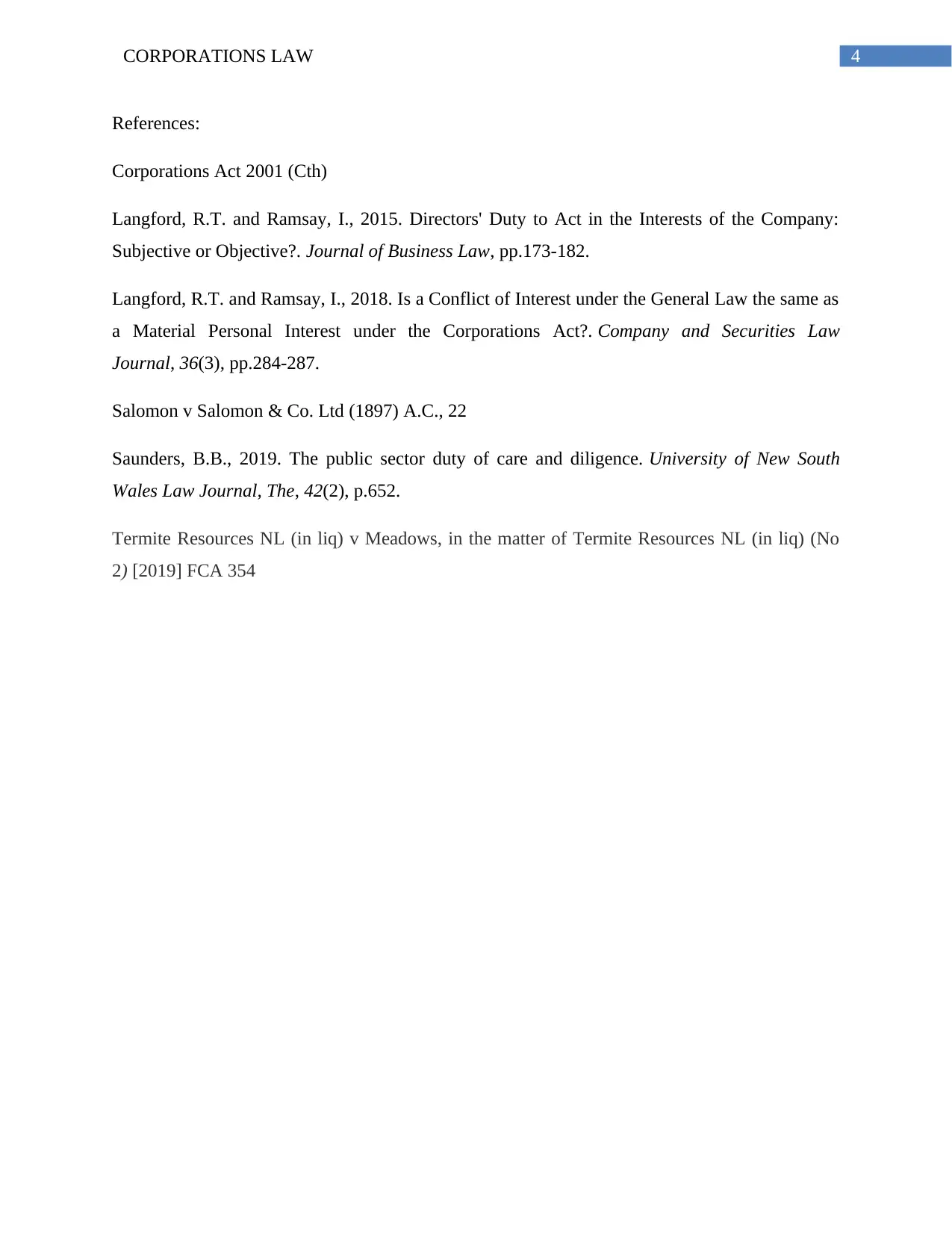
4CORPORATIONS LAW
References:
Corporations Act 2001 (Cth)
Langford, R.T. and Ramsay, I., 2015. Directors' Duty to Act in the Interests of the Company:
Subjective or Objective?. Journal of Business Law, pp.173-182.
Langford, R.T. and Ramsay, I., 2018. Is a Conflict of Interest under the General Law the same as
a Material Personal Interest under the Corporations Act?. Company and Securities Law
Journal, 36(3), pp.284-287.
Salomon v Salomon & Co. Ltd (1897) A.C., 22
Saunders, B.B., 2019. The public sector duty of care and diligence. University of New South
Wales Law Journal, The, 42(2), p.652.
Termite Resources NL (in liq) v Meadows, in the matter of Termite Resources NL (in liq) (No
2) [2019] FCA 354
References:
Corporations Act 2001 (Cth)
Langford, R.T. and Ramsay, I., 2015. Directors' Duty to Act in the Interests of the Company:
Subjective or Objective?. Journal of Business Law, pp.173-182.
Langford, R.T. and Ramsay, I., 2018. Is a Conflict of Interest under the General Law the same as
a Material Personal Interest under the Corporations Act?. Company and Securities Law
Journal, 36(3), pp.284-287.
Salomon v Salomon & Co. Ltd (1897) A.C., 22
Saunders, B.B., 2019. The public sector duty of care and diligence. University of New South
Wales Law Journal, The, 42(2), p.652.
Termite Resources NL (in liq) v Meadows, in the matter of Termite Resources NL (in liq) (No
2) [2019] FCA 354
1 out of 5
Related Documents
Your All-in-One AI-Powered Toolkit for Academic Success.
+13062052269
info@desklib.com
Available 24*7 on WhatsApp / Email
![[object Object]](/_next/static/media/star-bottom.7253800d.svg)
Unlock your academic potential
Copyright © 2020–2026 A2Z Services. All Rights Reserved. Developed and managed by ZUCOL.


![Analysis of Asden Developments Pty Ltd v Dinoris (No 3) [2016] FCA 788](/_next/image/?url=https%3A%2F%2Fdesklib.com%2Fmedia%2Fliquidator-breach-of-duties_page_2.jpg&w=256&q=75)


![In-depth Case Study of ASIC v Flugge & Geary [2016] VSC 779 Law](/_next/image/?url=https%3A%2F%2Fdesklib.com%2Fmedia%2Fdocument%2Fpages%2F2024-07-29%2Fasic-v-flugge-geary-2016-vsc-779-a-case-study-on-directors-duties-page-2.webp&w=256&q=75)